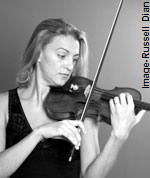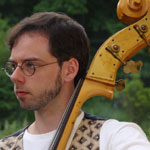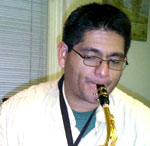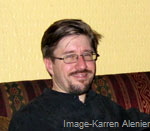|
Although the Steiny Road Poet has always entertained the far-flung notion that she would enjoy being a conductor of a large orchestra, the truth is she knew little about the experience until she interviewed John Yaffé in June 2006 for Scene4 Magazine (qv). Yaffé was not only the conductor of the world premiere of Gertrude Stein Invents A Jump Early On by composer William Banfield and poet Karren LaLonde Alenier, but also the music director for this Encompass New Opera Theatre production developed by Nancy Rhodes. Having learned about Yaffé's process as a music director, the Poet realized the next logical aspect of the opera business to learn would be the experience of being a musician in an orchestra playing for a new theatrical work. So with John Yaffé's help, she successfully contacted pianist Christopher Fecteau, first violinist Patrisa Tomassini, saxophonist Javier Oviedo, and bassist Mark Wade. Other members of this orchestra were second violinist Suzanne Chaplin, cellist John Kneiling, and drummer/percussionist David Cox.
THE MEASURE OF THE MUSICAL EXPERIENCE
The Poet asked the musicians the same ten questions. Half of the questions pertained to their musical background, experience, and personal goals. Two of the questions concerned their experience playing for theatrical gigs. The last three questions addressed aspects of playing for Gertrude Stein Invents A Jump Early On. Lacking the opportunity to sit down over drinks hot or cold with these busy artists who often juggle numerous jobs and projects that may take them far away from home base, the Poet got most of her responses in email messages except for a phone conversation with Javier Oviedo. Most of the questions produced a wide range of answers. Also two out of the three missing orchestral members did initially agree to participate in the interview but got too busy to respond. David Cox said, "I will be glad to help with your interview questions. I must tell you that I am totally swamped and often put in 12-14 hour days... I enjoyed the experience immensely, Yaffé being a wonderful director."
THE ORCHESTRAL PROFILE
Before the Poet delivers the frank responses, a quick profile of the four responding musicians will help the reader understand the various points of view.
Violinist Patrisa Tomassini and bassist Mark Wade earn their living by playing
 music. Tomassini, who received a bachelor of music from Mannes College, plays all kinds of music that has included Broadway shows, the Letterman Show, Sting, Bono, P. Diddy, Michael Jackson, Frank Sinatra Jr., Gloria Estefan, José Carreras and others. music. Tomassini, who received a bachelor of music from Mannes College, plays all kinds of music that has included Broadway shows, the Letterman Show, Sting, Bono, P. Diddy, Michael Jackson, Frank Sinatra Jr., Gloria Estefan, José Carreras and others.
 Wade, who has an undergraduate degree in jazz from New York University, plays jazz and classical that has included Broadway and Off Broadway shows as well as gigs at Lincoln Center and with the Key West Symphony and the One World Symphony. As to ideal gigs and goals for the next five to ten years, Tomassini quipped "You pay, I play," whereas Wade said more introspectively that he wants to "play better and get better gigs" either in jazz or classical concerts. Wade, who has an undergraduate degree in jazz from New York University, plays jazz and classical that has included Broadway and Off Broadway shows as well as gigs at Lincoln Center and with the Key West Symphony and the One World Symphony. As to ideal gigs and goals for the next five to ten years, Tomassini quipped "You pay, I play," whereas Wade said more introspectively that he wants to "play better and get better gigs" either in jazz or classical concerts.
Javier Oviedo holds a post-graduate Certificate of Professional Studies from
 Mannes College and master and bachelor degrees in music specializing in classical saxophone performance from the University of Texas at Austin. He teaches at Mannes College and the French-American School of Music at Carnegie Hall where he just became director and chair of the brass and woodwind department. He says it is unusual for a classical saxophonist to double, that is, play other woodwind instruments, but as a teacher this versatility is necessary. His current passion is a special project on researching music for an historical CD recording of compositions that include parts for the classical saxophone. He will travel to Paris to do research at the Bibliothèque nationale de France. Mannes College and master and bachelor degrees in music specializing in classical saxophone performance from the University of Texas at Austin. He teaches at Mannes College and the French-American School of Music at Carnegie Hall where he just became director and chair of the brass and woodwind department. He says it is unusual for a classical saxophonist to double, that is, play other woodwind instruments, but as a teacher this versatility is necessary. His current passion is a special project on researching music for an historical CD recording of compositions that include parts for the classical saxophone. He will travel to Paris to do research at the Bibliothèque nationale de France.
Christopher Fecteau has a Bachelor of Fine Arts in piano performance and a
 Master of Music in orchestral conducting from the Carnegie Mellon University School of Music. While he was working on his master degree, he was also a graduate assistant in the opera department. Playing almost exclusively opera music, he works as a vocal coach and conductor specializing in the Italian repertoire. Fecteau said," I prefer conducting chamber opera in small spaces for intimate audiences. I often create chamber ensemble reductions of full orchestrations to make this possible." He is founder and Artistic Director of dell'Arte Opera Ensemble in New York City and he is the Assistant Conductor of Opera in the Heights, a small opera company in Houston. Through the dell'Arte Opera Ensemble Summer Readings Project, he has helped young singers add important roles to their repertoire. His immediate goal for himself is to continue developing his conducting career. Master of Music in orchestral conducting from the Carnegie Mellon University School of Music. While he was working on his master degree, he was also a graduate assistant in the opera department. Playing almost exclusively opera music, he works as a vocal coach and conductor specializing in the Italian repertoire. Fecteau said," I prefer conducting chamber opera in small spaces for intimate audiences. I often create chamber ensemble reductions of full orchestrations to make this possible." He is founder and Artistic Director of dell'Arte Opera Ensemble in New York City and he is the Assistant Conductor of Opera in the Heights, a small opera company in Houston. Through the dell'Arte Opera Ensemble Summer Readings Project, he has helped young singers add important roles to their repertoire. His immediate goal for himself is to continue developing his conducting career.
TIGHT VERSUS INVISIBLE
When the Poet asked, "Could you describe the experience of playing with theatrical works," she unintentionally steered the answer away from the details she wanted to know about. She did this by also asking if it bothered the musician not to get more attention for their contribution, especially when the work was brand new. Tomassini, Wade, and Fecteau answered this set of questions by saying it didn't really bother them not to be in the limelight. Tomassini: "I don't play for attention, but rather for my own pleasure and because this is what I do for a living." Wade: "[I'm] not in it for the recognition." Fecteau, who also served as John Yaffé's assistant, answered: "As a coach preparing singers to create new roles, often one does feel 'invisible' when the production actually happens, but there is satisfaction that comes both from experiencing gratitude from the singers, and also from seeing and hearing them include elements of the work that you did with them in the coaching studio."
Only Oviedo talked about the physical experience of being part of a theatrical orchestra and he tied what he said to the world premiere performances of the Stein opera. At the Symphony Space Leonard Nimoy Thalia, a theater accommodating 145 to 172 audience seats, the curtain-less 19 feet wide by 11 feet deep stage was tight for ten performers. The seven musicians and conductor were positioned in an alcove and a railed and narrow walkway along the stage left side of the audience. Oviedo, whose job it was to play clarinet, flute and two different pitched saxophones, said he had plenty of room at the back of the alcove, but he was behind a pillar and had to lean out to see conductor John Yaffé. He also added that the space for the orchestra was challenging because the string players had to be positioned behind where the conductor needed to stand so that the singers could see his cues. Oviedo said one of the benefits of playing in a small orchestra was that he, as the only woodwind player, did not have to worry about matching his sound to any other woodwind players. What Oviedo likes about playing in a small theater is being close to the audience. "It helps to be close to the audience. You pick up on their reactions and you go with that."
WHO'S IN CHARGE?
To the question "What do you expect from a music director to make your experience successful," Wade said succinctly "competence and respect." Tomassini said pragmatically that she works with the direction given and makes the best of it. Oviedo explained that a good conductor like JohnYaffé will allow the musician to explore, but know when to rein in the musicians. Oviedo added, "I like it when the conductor is not an alpha dog." Fecteau, who works as a music director, added a different perspective and tailored the answer in part to his experience in playing William Banfield's music:
"I expect a tremendous amount of vision, first of all, and understanding of the information that's both ON the page and 'between the lines.' The music director must create a sonic landscape (in the case of a new work) from scratch, but including all of the various experiences he's had in the past. This particular score has many influences, from 20th and 21st century 'serious' music to equally 'serious' jazz influences. The Music Director must integrate these elements, and convey them to all of those playing and singing the score. The Music Director also must coordinate carefully and consistently with the Stage Director so that the two are not working at cross-purposes. It's got to be collaborative at the top of the ladder."
WHAT STICKS IN THE MIND AFTER THE SHOW CLOSES
By asking the musicians about themselves (their education, their past musical experiences, and their aspirations) and their general experience in playing for theatrical productions, the Poet hoped to better understand their answers to questions specific to the world premiere of Gertrude Stein Invents A Jump Early On. There's a certain amount of risk a creating artist takes in asking point blank questions like, "did you like my work?" Here's what the Poet asked:
Does anything stick in your mind about the experience of playing Bill Banfield's music?
Was it helpful having the composer available during rehearsals?
If you had the opportunity to play this music again, what would you want to be different about a second experience versus the first?
To the question about playing Banfield's music, the musicians gave a range of more or less positive answers. Tomassini said that she "Loved the jazzy bits, all the rest is a blur." Wade said the music was "[a] curious mix of jazz and modern classical." Oviedo, who explained he is not an improvisational player, said Banfield's music is "more in the popular vein." He also said he was surprised there weren't more parts for the saxophone though he pointed out that the last aria sung by Gertrude Stein has a beautiful soprano sax accompaniment. Again Fecteau's answer provided a broader perspective:
"It was a JOY to be able to realize Bill's wonderful music. For the most part, his music is very accessible and player friendly, though the vocal settings are not always as successful. Sometimes the notation could have been clearer (when classically oriented) or more 'open' (when jazz oriented). I know that the bassist, for instance, would have appreciated having some of the sections written in jazz format with chords, rather than a full-written-out line. It was great working with a good rhythm section. The underscores need to be more flexible (short length) and less musically 'busy' so that they don't distract from the dialogue, but support it. Basically, Bill is a very modern composer, and the music needs to be played by people that understand the idiom."
Was it helpful to have the creating composer present during rehearsal produced the most surprising range of answers. Tomassini said she didn't recall. Wade said no. Oviedo said, "I loved that Bill was there. We got to be the first people to set the standard and create the music. Bill was like a little kid reacting to what we played." Fecteau said,
"Yes and no. The composer's involvement should take place much earlier in the process, and in small doses. The arrival of the composer only days before performances begin is almost always stressful and unproductive. Bill did have good suggestions, and tried hard to be unobtrusive, but his presence at the last minute did cause unnecessary stress and some distractions because of discrepancies between singers', the music director's and the composer's wishes."
The final question related to improving the work also produced a range of answers. Tomassini said, "It wasn't my call to make it better or to think about it much, after it was all over. I do a million gigs a year and honestly I don't remember much about it." Wade answered in two words, "Better orchestration." Oviedo reflected that a second shot at playing this music would bring new energy to the piece and that the dynamic between singers and musicians would change. He also added that he would like to have a better physical space for the orchestra. Fecteau provided a comprehensive assessment that included comments about the libretto,
"More time with the rhythm section in rehearsals. EARLIER participation of the composer. More aggressive musical direction (but with more awareness of the jazz idiom). Better ('hipper') string players. More vocal music, rather than so much underscore. To be honest, I'd love to music direct this piece, but only after it's had some major revisions. Though it's episodic and doesn't try to tell the full story of GS, it could stand to be more linear. More than anything, I think the entire piece needs to be treated more like a Broadway piece, with EVERYTHING mic'ed and run through a sound system for balance issues. Those are the sensibilities of the piece, and the piece will work so much better that way."
MORE FROM THE SCHOOL OF HARD KNOCKS
Besides taking in the thought-provoking comments specific to the Stein opera, The Poet learned the following:
1. A whole new appreciation for how hard the job as music director is.
Presenting a new work that rides the line between opera and music theater presents many challenges. In her Scene4 interview with John Yaffé, he talked about learning the music and libretto as well as working with the singers and orchestra. What we did not talk about was the process of selecting musicians. Who the music director picks to play in his or her orchestra absolutely affects the outcome. Balancing the talent, experience, and attitude that each musician brings to an orchestral job is a tough job.
What was unusual about the music of the Stein opera is that it required some ability to play improvisationally with which most classical musicians have little experience. How the composer writes down the music makes a difference to a musician who is used to playing improvisationally. No matter how well the orchestral music has been scored or how available the composer is during the rehearsal period, the music director has to take responsibility for teaching the musicians how to play the work. The Poet believes YaffĂ© was successful in managing his orchestra given that Anthony Tommasini in his New York Times review of the Stein opera said, "…YaffĂ© drew a lithe performance from the musicians."
2. New insights on the management of theatrical space.
The Poet knows that Nancy Rhodes, the artistic director of Encompass New Opera Theatre, spent a lot of time debating the pros and cons of which theater would work best for the world premiere of Gertrude Stein Invents A Jump Early On. Factors such as availability during the time period the company wanted to produce the work, size (for a text intensive work like the Stein opera, a small theater was critical), cost, location, and services provided all influenced what Rhodes would select. The Thalia, which was originally built as film theater, was later retrofitted as a theater for live performances.
The Poet recalls that Rhodes said it was possible to remove seats and put the orchestra on the floor in front of the stage, but there were a number of disadvantages. The Poet doesn't remember if Rhodes said this, but the Poet believes that putting the orchestra between the singers and the audience would have diminished the intimacy achieved by having the orchestra positioned to one side. Oviedo's comments helped the Poet understand the challenges that the musicians and the conductor faced in being in that alcove and walkway space.
3. How a musician's goals change how he or she views working with a new theatrical production.
During the production run of the Stein opera, the Poet had limited contact with the orchestra. She attended the rehearsals, including the Sitzprobe where singers were first introduced to the orchestra, but except for a short conversation with Chris Fecteau at a party following the opening night performance, she had no significant one-on-contact with these musicians. What's clear from the interviews is that each of these artists is passionate about the work that they do. Those who are strictly performers have a different tolerance and outlook on a new work versus those who are also teachers and scholars.
4. Be careful about how questions are further defined.
In this interview, the most important question to the Poet concerned a musician's experience in playing for a theatrical work. Not only did she learn that she spun the question in the wrong direction, but she found out how much more productive it can be to talk to an interview subject on the phone. Nonetheless it took several days of broken appointments to actually connect with Javier Oviedo, who preferred that the interview be live instead of written.
DEBRIEFING: A NEW SUBJECT FOR OPERA
These lessons absorbed makes the Poet think how exciting it would be to assemble the entire cast, orchestra, crew, and directors one week after the close of the production to have a debriefing. Would the creators be able to absorb such comments? The Poet feels sure this event for comments would have to be organized carefully, maybe as carefully as mounting the world premiere production that continues to radiate into the universe.
|
